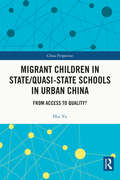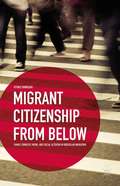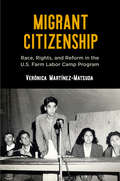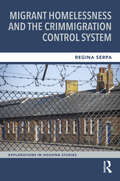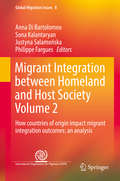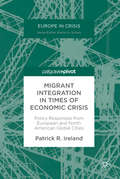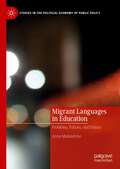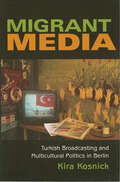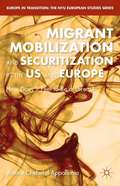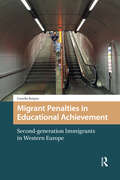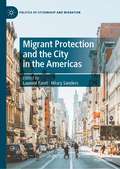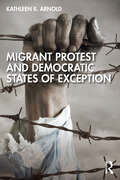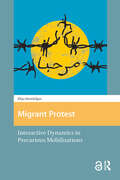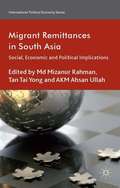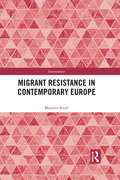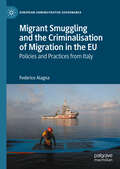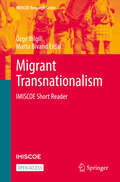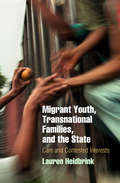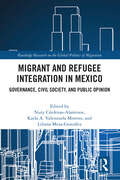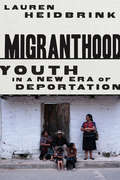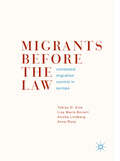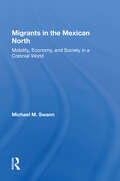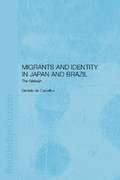- Table View
- List View
Migrant Children in State/Quasi-state Schools in Urban China: From Access to Quality? (China Perspectives)
by Hui YuHighlighting the changing landscape of Chinese urban state schools under the pressure of recruiting a tremendous number of migrant children, this book examines the quality of state educational provisions from demographic, institutional, familial and cultural angles. Rooted in rich qualitative data from five Chinese metropolitan cities, it identifies the demographic changes in many state schools of becoming ‘migrant majority’ and the institutional reformation of ‘interim quasi-state’ schools under a low cost and inferior schooling approach. This book also digs into the ‘black box’ of cultural reproduction in school and family processes, revealing both a gloomy side of many migrant children’s academic underachievement as a result of troubled home-school relations and a bright side that social inclusion of migrant children in state school promotes their adaptation to urban life. The author concludes that migrant children’s experiences in state (and quasi-state) schools turn them into a generation of ‘new urban working-class’. The monograph will be of interest to scholars, students, practitioners and policymakers who want to better understand educational equality for migrants and other marginalised groups.
Migrant Citizenship from Below
by Kyoko ShinozakiMigrant Citizenship from Below explores the dynamic local and transnational lives of Filipina and Filipino migrant domestic workers living in Sch#65533;nberg, Germany. Shinozaki examines their irregular migrant citizenship status from 'above', which is produced by complex interactions between Germany's welfare, care, and migration regimes and the Philippines' gendered politics of overseas employment. Despite the predominant representation of these workers as invisible, these spatially immobile migrants maintain sustained transnational engagements through parenting and religious practices. Shinozaki studies the reverse-gendered process of international reproductive labor migration, in which women traveled first and were later joined by men. Despite their structural vulnerability, participant observations and biographical interviews with the migrants demonstrate that they enact and negotiate migrant citizenship in the workplace, transnational households, religious practices and through accessing health provisions.
Migrant Citizenship: Race, Rights, and Reform in the U.S. Farm Labor Camp Program (Politics and Culture in Modern America)
by Verónica Martínez-MatsudaAn examination of the Farm Security Administration's migrant camp system and the people it servedToday's concern for the quality of the produce on our plates has done little to guarantee U.S. farmworkers the necessary protections of sanitary housing, medical attention, and fair labor standards. The political discourse on farmworkers' rights is dominated by the view that migrant workers are not entitled to better protections because they are "noncitizens," as either immigrants or transients. Between 1935 and 1946, however, the Farm Security Administration (FSA) intervened dramatically on behalf of migrant families to expand the principles of American democracy, advance migrants' civil rights, and make farmworkers visible beyond their economic role as temporary laborers. In more than one hundred labor camps across the country, migrant families successfully worked with FSA officials to challenge their exclusion from the basic rights afforded by the New Deal.In Migrant Citizenship, Verónica Martínez-Matsuda examines the history of the FSA's Migratory Labor Camp Program and its role in the lives of diverse farmworker families across the United States, describing how the camps provided migrants sanitary housing, full on-site medical service, a nursery school program, primary education, home-demonstration instruction, food for a healthy diet, recreational programing, and lessons in participatory democracy through self-governing councils. In these ways, she argues, the camps functioned as more than just labor centers aimed at improving agribusiness efficiency. Instead, they represented a profound "experiment in democracy" seeking to secure migrant farmworkers' full political and social participation in the United States. In recounting this chapter in the FSA's history, Migrant Citizenship provides insights into public policy concerning migrant workers, federal intervention in poor people's lives, and workers' cross-racial movements for social justice and offers a precedent for those seeking to combat the precarity in farm labor relations today.
Migrant Dubai: Low Wage Workers and the Construction of a Global City (Global Diversities)
by Laavanya KathiraveluMigrant Dubai.
Migrant Homelessness and the Crimmigration Control System (Explorations in Housing Studies)
by Regina SerpaMigrant Homelessness and the Crimmigration Control System offers new insights into the drivers of homelessness following migration by unpacking the housing consequences of ‘crimmigration’ control systems in the US and the UK. The book advances ‘housing sacrifice’ as a concept to understand journeys in and out of homelessness and the coping strategies migrants employ. Undergirded by persuasive empirical research, it offers a compelling case for a ‘social citizenship’ right to housing guaranteed across social, political and civil realms of society. The book is structured around the 30 life stories of people who have migrated to the capital cities of Boston and Edinburgh from Central America and Eastern Europe. The narratives are complemented by interviews with a range of stakeholders (including frontline caseworkers, activists and policymakers). Guided by the tenets of critical realist theory, this book offers a biographical inquiry into the intersections of race, class and gender and provides insight into the everyday precarity homeless migrants face, by listening to them directly. It will be of interest to students, scholars, and policymakers across a range of fields including housing, immigration, criminology, sociology, and human geography.
Migrant Homelessness and the Crimmigration Control System (ISSN)
by Regina SerpaMigrant Homelessness and the Crimmigration Control System offers new insights into the drivers of homelessness following migration by unpacking the housing consequences of ‘crimmigration’ control systems in the US and the UK. The book advances ‘housing sacrifice’ as a concept to understand journeys in and out of homelessness and the coping strategies migrants employ. Undergirded by persuasive empirical research, it offers a compelling case for a ‘social citizenship’ right to housing guaranteed across social, political and civil realms of society. The book is structured around the 30 life stories of people who have migrated to the capital cities of Boston and Edinburgh from Central America and Eastern Europe. The narratives are complemented by interviews with a range of stakeholders (including frontline caseworkers, activists and policymakers). Guided by the tenets of critical realist theory, this book offers a biographical inquiry into the intersections of race, class and gender and provides insight into the everyday precarity homeless migrants face, by listening to them directly. It will be of interest to students, scholars, and policymakers across a range of fields including housing, immigration, criminology, sociology, and human geography.
Migrant Integration between Homeland and Host Society Volume 2
by Philippe Fargues Anna Di Bartolomeo Sona Kalantaryan Justyna SalamońskaThis book provides solid empirical evidence into the role that countries and communities of origin play in the migrant integration processes at destination. Coverage explores several important questions, including: To what extent do policies pursued by receiving countries in Europe and the US complement or contradict each other? What effective contribution do they make to the successful integration of migrants? What obstacles do they put in their way? This title is the second of two complementary volumes, each of which is designed to stand alone and provide a different approach to the topic. Here, renowned contributors present evidence from the studies of 55 origin countries on five continents and 28 countries of destination in Europe where both quantitative and qualitative research was conducted. In addition, the chapters detail results of a unique worldwide survey of 900 organisations working on migrant integration and diaspora engagement. The results draw on an innovative methodology and new approaches to the analysis of large-scale survey data. This examination into the tensions between integration policies and diaspora engagement policies will appeal to academics, policymakers, integration practitioners, civil society organisations, as well as students. Overall, the chapters provide empirical evidence that builds upon a theoretical framework developed in a complementary volume: Migrant integration between Homeland and Host society. Vol. 1. Where does the country of origin fit? by A. Unterreiner, A. Weinar. and P. Fargues.
Migrant Integration in Times of Economic Crisis
by Patrick R. IrelandThis book examines how the severe economic downturn following the 2007-2008 financial crisis affected the structural integration and quality of life of urban migrants in Europe and North America. It compares the experiences of migrants from Poland, Romania, Serbia, Pakistan, and Ghana in five similar, secondary global cities of Hamburg (Germany), Barcelona (Spain), Chicago (USA), Toronto (Ontario, Canada), and Montr#65533;al (Qu#65533;bec, Canada) over the period of 2000-2015. The work uses statistical analysis to gauge changes in residential segregation and structural integration (such as unemployment, poverty, and social assistance rates). It then provides qualitative analyses of individual city neighborhoods where the target migrant groups have settled, exploring each community's unique evolution and the ambivalent impact that local policy responses have had on their quality of life. With this study, researchers, instructors, students, and policymakers with an interest in migration, urban development, and global cities will be far more knowledgeable of both the potential and limits of policy efforts.
Migrant Languages in Education: Problems, Policies, and Politics (Studies in the Political Economy of Public Policy)
by Anna MalandrinoThis book examines language education policy in European migrant-hosting countries. By applying the Multiple Streams Framework to detailed case studies on Austria and Italy, it sheds light on the factors and processes that innovate education policy. The book illustrates an education policy design that values language diversity and inclusion, and compares underlying policymaking processes with less innovative experiences. Combining empirical analysis and qualitative research methods, it assesses the ways in which language is intrinsically linked to identity and political power within societies, and how language policy and migration might become a firmer part of European policy agendas. Sitting at the intersection between policy studies, language education studies and integration studies, the book offers recommendations for how education policy can promote a more inclusive society. It will appeal to scholars, practitioners and students who have an interest in policymaking, education policy and migrant integration.
Migrant Media: Turkish Broadcasting and Multicultural Politics in Berlin (New Anthropologies of Europe)
by Kira KosnickIn this innovative and thought-provoking study, Kira Kosnick explores the landscape of Turkish-language broadcasting in Berlin. From 24-hour radio broadcasting in Turkish to programming on Germany's national public broadcasting and local public access channels, Germany's largest immigrant minority has made its presence felt in German media. Satellite dishes have appeared in migrant neighborhoods all over the city, giving viewers access to Kurdish channels and broadcasts from Turkey. Kosnick draws on interviews with producers, her own participation in production work, and analysis of programs to elaborate a new approach to "migrant media" in relation to the larger cultural and political spaces through which immigrant life is imagined and created.
Migrant Mobilization and Securitization in the US and Europe: How Does It Feel to Be a Threat? (Europe in Transition: The NYU European Studies Series)
by Ariane Chebel D’appolloniaImmigrants and minorities in Europe and America have responded in diverse ways to security legislation introduced since 9/11 that targets them, labeling them as threats. This book identifies how different groups have responded and explains why, synthesizing findings in the fields of securitization, migrant integration, and migrant mobilization.
Migrant Penalties in Educational Achievement: Second-generation Immigrants in Western Europe (Changing Welfare States)
by Camilla BorgnaThe integration of second-generation immigrants has proved to be a major challenge for Europe in recent years. Though these people are born in their host nations, they often experience worse social and economic outcomes than other citizens. This volume focuses on one particular, important challenge: the less successful educational outcomes of second-generation migrants. Looking at data from seventeen European nations, Camilla Borgna shows that migrant penalties in educational achievement exist in each one-but that, unexpectedly, the penalties tend to be greater in countries in which socio-economic inequalities in education are generally more modest, a finding that should prompt reconsideration of a number of policy approaches.
Migrant Protection and the City in the Americas (Politics of Citizenship and Migration)
by Laurent Faret Hilary SandersThis book aims to establish a dialogue around the various “urban sanctuary” policies and other formal or informal practices of hospitality toward migrants that have emerged or been strengthened in cities in the Americas in the last decade. The authors articulate local governance initiatives in migrant protection with a larger range of social and political actors and places them within a broader context of migrations in the Western Hemisphere (including case studies of Toronto, New York, Austin, Mexico City, and Lima, among others). The book analyzes in particular the limits of local efforts to protect migrants and to identify the latitude of action at the disposal of local actors. It examines the efforts of municipal governments and also considers the role taken by cities from a larger perspective, including the actions of immigrant rights associations, churches, NGOs, and other actors in protecting vulnerable migrants.
Migrant Protest and Democratic States of Exception
by Kathleen R. ArnoldRecognizing the radical disparity between migration/border policy and constitutional law "inside these borders," Kathleen R. Arnold focuses on two main forms of migrant protest to explore the meaning of resistance in a sovereign context: self-harming protest by detainees and faith-based sanctuary of individuals scheduled for detention. This activism creates a "democratic state of exception," interrupting the legal process, altering discretionary forms of sovereign power, and enacting rights not formally granted; these efforts go beyond the assertion of liberal rights or merely restoring the rule of law (even if these are goals), challenging the warfare state while constituting a demos that is formally illegible. Migrant Protest and Democratic States of Exception will be of interest to scholars, migrant advocacy professionals (including INGO and IGO officers), graduate students, and advanced undergraduate students in a variety of fields from legal studies to forced migration and refugee studies; political science, human rights, protest history and contemporary movements.
Migrant Protest: Interactive Dynamics in Precarious Mobilizations (Protest and Social Movements)
by Elias SteinhilperMigrant protest has proliferated worldwide in the last two decades, explicitly posing questions of identity, rights, and equality in a globalized world. Nonetheless, such mobilizations are often considered anomalies in social movement studies, and political sociology more broadly, due to weak interests and a particularly disadvantageous position of outsiders to claim rights connected to citizenship. In an attempt to address this seeming paradox, Migrant Protest: Interactive Dynamics in Precarious Mobilizations explores the interactions and spaces shaping the emergence, trajectory, and fragmentation of migrant protest in unfavorable contexts of marginalization. Such a perspective unveils both the odds of precarious mobilizations and the ways they can be temporarily overcome. While adopting the encompassing terminology of migrant, this book focuses on precarious migrants, including both asylum seekers and illegalized migrants.
Migrant Remittances in South Asia: Social, Economic and Political Implications (International Political Economy Series)
by Md Mizanur RahmanThis volume provides theoretical treatments of remittance on how its development potential is translated into reality. The authors meticulously delve into diverse mechanisms through which migrant communities remit, investigating how recipients engage in the development process in South Asia.
Migrant Resistance in Contemporary Europe (Interventions)
by Maurice StierlOver the past few years, increased ‘unauthorised’ migrations into the territories of Europe have resulted in one of the most severe crises in the history of the European Union. Stierl explores migration and border struggles in contemporary Europe and the ways in which they animate, problematise, and transform the region and its political formation. This volume follows public protests of migrant activists, less visible attempts of those on the move to ‘irregularly’ subvert borders, as well as new solidarities and communities that emerge in interwoven struggles for the freedom of movement. Stierl offers a conceptualisation of migrant resistances as forces of animation through which European forms of border governance can be productively explored. As catalysts that set socio-political processes into frictional motion, they are developed as modes of critical investigation, indeed, as method. By ethnographically following and being implicated in different migration struggles that contest the ways in which Europe decides over and enacts who does, and does not, belong, the author probes what they reveal about the condition of Europe in the contemporary moment. This work will be of great interest to students and scholars of Migration, Border, Security and Citizenship Studies, as well as the Political Sciences more generally.
Migrant Smuggling and the Criminalisation of Migration in the EU: Policies and Practices from Italy (European Administrative Governance)
by Federico AlagnaThis book examines migrant smuggling and migration governance in the European Union. Following the 'refugee crisis' of 2014-15 and the rise in the number of people crossing the Mediterranean Sea, growing concern has been expressed in the media and elsewhere as to how EU institutions have tackled migrant smuggling. Focusing particularly on Italy during the period of the Eighth European Parliament (2014-19), the book assesses the evolution of anti-smuggling policies at EU and national level, and considers why institutions and policy-makers have failed to fully address the issue. Adopting a bottom-up approach, it also analyses the roles that people on the move, smugglers, law enforcers, the judiciary and border guards play in influencing policy processes. With political and public debates over migration more vociferous than ever, the book provides important insights into the EU approach to migrant smuggling. It will appeal to all those interested in public policy, migration studies, European politics and criminology.
Migrant Transnationalism: IMISCOE Short Reader (IMISCOE Research Series)
by Marta Bivand Erdal Özge BilgiliThis open access short reader provides a compelling introduction to research on migrant transnationalism. The short reader focuses on the significant area of remittances (in financial terms). However, attention is also paid to political, social, cultural and religious transfers and exchanges – underscoring the salience of the wide range of ties that are maintained across borders. Increasingly such ties are sustained through virtual and technology facilitated modes of interaction. Drawing on established and recent empirical research from across the globe, in dialogue with scholars of migrant transnationalism, the book offers an overview of approaches, conceptual tools, thematic areas, and methods of investigation. Thus, this short reader sheds light on the fundamentals of existing knowledge on migrant transnationalism: What are the key questions in migrant transnationalism research today? How does a transnational perspective deepen our understanding of migration, (social) mobility, diversity, inclusion and development? As a source for researchers, students and policy makers, this short reader is essential reading which shows why looking at the world through a transnational lens adds value, for anyone interested in migration and social change.
Migrant Youth, Transnational Families, and the State: Care and Contested Interests (Pennsylvania Studies in Human Rights)
by Lauren HeidbrinkEach year, more than half a million migrant children journey from countries around the globe and enter the United States with no lawful immigration status; many of them have no parent or legal guardian to provide care and custody. Yet little is known about their experiences in a nation that may simultaneously shelter children while initiating proceedings to deport them, nor about their safety or well-being if repatriated. Migrant Youth, Transnational Families, and the State examines the draconian immigration policies that detain unaccompanied migrant children and draws on U.S. historical, political, legal, and institutional practices to contextualize the lives of children and youth as they move through federal detention facilities, immigration and family courts, federal foster care programs, and their communities across the United States and Central America.Through interviews with children and their families, attorneys, social workers, policy-makers, law enforcement, and diplomats, anthropologist Lauren Heidbrink foregrounds the voices of migrant children and youth who must navigate the legal and emotional terrain of U.S. immigration policy. Cast as victims by humanitarian organizations and delinquents by law enforcement, these unauthorized minors challenge Western constructions of child dependence and family structure. Heidbrink illuminates the enduring effects of immigration enforcement on its young charges, their families, and the state, ultimately questioning whose interests drive decisions about the care and custody of migrant youth.
Migrant and Refugee Integration in Mexico: Governance, Civil Society, and Public Opinion (Routledge Research on the Global Politics of Migration)
by Nuty Cárdenas-Alaminos Valenzuela Moreno, Karla A. Liliana Meza-GonzálezAlthough Mexican emigration to the United States is still relevant, it has also become a return, transit, and recipient country for thousands of refugees. Now, many of these migrants, refugees, and their families stay on Mexican soil territory, trying to integrate within Mexican society.This book brings together leading experts in Mexico and covers the political dimension of integration for migrants in Mexico analyzing integration policies, civil society efforts, and public opinion from various angles. In this context, many questions arise. Among the most relevant: What has the federal government done to assist these migrant groups, who often arrive in conditions of great vulnerability? What policies have been implemented at the subnational level of government to adequately integrate these population groups? What actions have been implemented by other local actors, such as civil society organizations? What do Mexicans think about newcomers? Immigrant integration in Mexico will be of interest to students and scholars across a range of disciplines including international relations, development studies, anthropology, international studies, sociology, and Latin American studies.
Migranthood: Youth in a New Era of Deportation
by Lauren HeidbrinkMigranthood chronicles deportation from the perspectives of Indigenous youth who migrate unaccompanied from Guatemala to Mexico and the United States. In communities of origin in Guatemala, zones of transit in Mexico, detention centers for children in the U.S., government facilities receiving returned children in Guatemala, and communities of return, young people share how they negotiate everyday violence and discrimination, how they and their families prioritize limited resources and make difficult decisions, and how they develop and sustain relationships over time and space. Anthropologist Lauren Heidbrink shows that Indigenous youth cast as objects of policy, not participants, are not passive recipients of securitization policies and development interventions. Instead, Indigenous youth draw from a rich social, cultural, and political repertoire of assets and tactics to navigate precarity and marginality in Guatemala, including transnational kin, social networks, and financial institutions. By attending to young people's perspectives, we learn the critical roles they play as contributors to household economies, local social practices, and global processes. The insights and experiences of young people uncover the transnational effects of securitized responses to migration management and development on individuals and families, across space, citizenship status, and generation. They likewise provide evidence to inform child protection and human rights locally and internationally.
Migrants Before the Law: Contested Migration Control in Europe
by Tobias G. Eule Lisa Marie Borrelli Annika Lindberg Anna WyssThis book traces the practices of migration control and its contestation in the European migration regime in times of intense politicization. The collaboratively written work brings together the perspectives of state agents, NGOs, migrants with precarious legal status, and their support networks, collected through multi-sited fieldwork in eight European states: Austria, Denmark, Germany, Italy, Latvia, Lithuania, Sweden and Switzerland. The book provides knowledge of how European migration law is implemented, used, and challenged by different actors, and of how it lends and constrains power over migrants’ journeys and prospects. An ethnography of law in action, the book contributes to socio-legal scholarship on migration control at the margins of the state.
Migrants In The Mexican North: Mobility, Economy And Society In A Colonial World
by Michael M SwannOriginally published in 1989, this study looks at the emigration and migration of people, including to and between urban centres, in 18th century Spanish American history.
Migrants and Identity in Japan and Brazil: The Nikkeijin
by Daniela de CarvalhoEconomic and social difficulties at the beginning of the 20th century caused many Japanese to emigrate to Brazil. The situation was reversed in the 1980s as a result of economic downturn in Brazil and labour shortages in Japan. This book examines the construction and reconstruction of the ethnic identities of people of Japanese descent, firstly in the process of emigration to Brazil up to the 1980s, and secondly in the process of return migration to Japan in the 1990s. The closed nature of Japan's social history means that the effect of return migration' can clearly be seen. Japan is to some extent a unique sociological specimen owing to the absence of any tradition of receiving immigrants. This book is first of all about migration, but also covers the important related issues of ethnic identity and the construction of ethnic communities. It addresses the issues from the dual perspective of Japan and Brazil. The findings suggest that mutual contact has led neither to a state of conflict nor to one of peaceful coexistence, but rather to an assertion of difference. It is argued that the Nikkeijin consent strategically to the social definitions imposed upon their identities and that the issue of the Nikkeijin presence is closely related to the emerging diversity of Japanese society.
